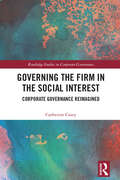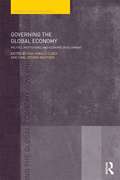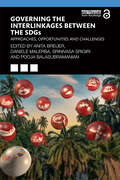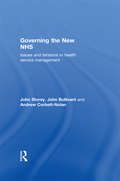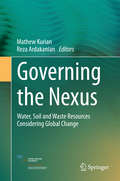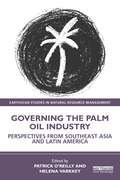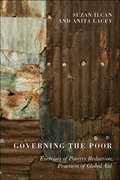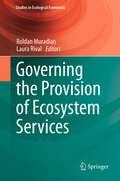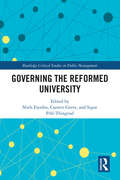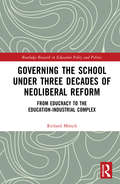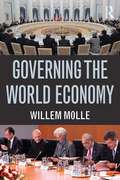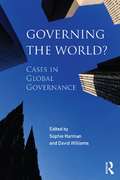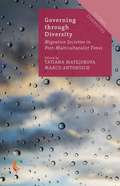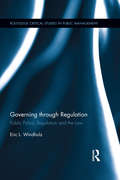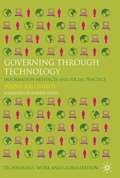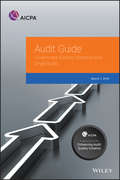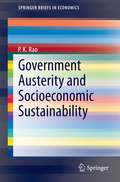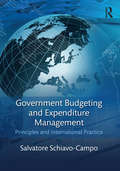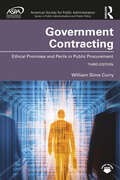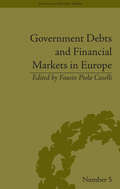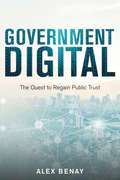- Table View
- List View
Governing the Energy Transition: Reality, Illusion or Necessity? (Routledge Studies in Sustainability Transitions)
by Derk Loorbach Geert VerbongThe Energy Transition, the inevitable shift away from cheap, centralized, largely fossil-based energy systems, is one of the core challenges of our time. This book provides a coherent and novel insight into the nature of this challenge and possible strategies to accelerate and guide such transitions. It brings together prominent European scholars and practitioners from the fields of energy transition research and governance to draw attention to the current complex dynamics in the energy domain, and offer elegant and provocative explanations for current crises and lock-ins. They identify multiple energy transition pathways that emerge and increasingly compete, and emphasize the need and possibilities for novel governance. By analysing the complexity of energy transition processes and the difficulties in shifting to sustainable pathways, this text questions the extent to which actually governing energy transitions is already reality, just an illusion, or a bare necessity.
Governing the Firm in the Social Interest: Corporate Governance Reimagined (Routledge Studies in Corporate Governance)
by Catherine CaseyThe corporate business enterprise is a core institution of capitalism. It holds immense political, economic, and cultural power in society. It mobilizes social and planetary resources to its utility in pursuit of private profit maximization and with little regard for social concerns. Its influence over so much of societal life and effects on the natural environment raise critical questions about the firm and its governance in democratic society. Various voices seek reforms of regulation and corporate governance practices to those shaped by the neoliberal policies persisting in the current decades. But prospects for amelioration within our current horizons of thinking appear elusive. This book contributes a distinctly social theoretical approach to the social problem of governing the firm. Its discussions complement debates in economics, politics, and law. Its critical social theorizations challenge conventional understandings of the firm and neoliberal legitimacies of its governance and posit alternatives. The book explores the social relations and moral fabric of the firm and the creativity of human action at work. It proposes a reimagined corporate governance premised on just recognition of that social vitality. It invites unprecedented collaboration for a robust participatory democracy for governing the firm and market action oriented to ecological and social sustainability.
Governing the Global Economy: Politics, Institutions and Economic Development (Routledge Studies in Globalisation)
by Dag Harald Claes Carl Henrik KnutsenGoverning the Global Economy explores the dynamic interaction between politics and economics, between states and markets and between international and domestic politics. The contributors study how the governance of the global economy is shaped by interaction between international institutions, domestic politics and multinational enterprises, from a wide range of theoretical perspectives and methods. Presenting a fresh approach to the study of international political economy, this volume covers: the systemic characteristics of the liberal world order, the role of international institutions, domestic economic politics and policies the strategies and behaviour of multinational enterprises. The volume also includes topical discussion of the challenges to the global economy from the recent financial crisis and analysis of economic politics, in particular the regions of Africa and Europe as well as the countries of Japan and South Korea. With contributions from prominent scholars in political science, economics and business studies, who have all contributed greatly to advancing the study of political economy over the last decade, Governing the Global Economy aims to bridge the gap between undergraduate textbooks and advanced theory. It is essential reading for all students and scholars of international political economy and globalization.
Governing the Interlinkages between the SDGs: Approaches, Opportunities and Challenges
by Anita Breuer Daniele Malerba Srinivasa Srigiri Pooja BalasubramanianGoverning the Interlinkages between the SDGs: Approaches, Opportunities and Challenges identifies the institutional processes, governance mechanisms and policy mixes that are conducive to devising strategies of integrated Sustainable Development Goal (SDG) implementation. The book edited by Anita Breuer, Daniele Malerba, Srinivasa Srigiri and Pooja Balasubramanian examines the dedicated policies targeting the SDGs, as well as political and institutional drivers of synergies and trade-offs between the SDGs in selected key areas – both cross-nationally and in specific country contexts. Their analysis moves beyond the focus on links between SDG indicators and targets. Instead, the book takes advantage of recent evidence from the initial implementation phase of the SDGs and each chapter explores the question of which political-institutional prerequisites, governance mechanisms and policy instruments are suited to accelerate the implementation of the SDGs. The findings presented are intended to both inform high-level policy debates and to provide orientation for practitioners working on development cooperation. This volume will be of great interest to practitioners and policy makers in the field of sustainable development, as well as academics in the fields of sustainability research, political science, and economics.
Governing the Market: Economic Theory and the Role of Government in East Asian Industrialization
by Robert WadePublished originally in 1990 to critical acclaim, Robert Wade's Governing the Market quickly established itself as a standard in contemporary political economy. In it, Wade challenged claims both of those who saw the East Asian story as a vindication of free market principles and of those who attributed the success of Taiwan and other countries to government intervention. Instead, Wade turned attention to the way allocation decisions were divided between markets and public administration and the synergy between them. <p><p>Now, in a new introduction to this paperback edition, Wade reviews the debate about industrial policy in East and Southeast Asia and chronicles the changing fortunes of these economies over the 1990s. He extends the original argument to explain the boom of the first half of the decade and the crash of the second, stressing the links between corporations, banks, governments, international capital markets, and the International Monetary Fund. From this, Wade goes on to outline a new agenda for national and international development policy.
Governing the New NHS: Issues and Tensions in Health Service Management
by John Storey John Bullivant Andrew Corbett-NolanThe new NHS is a very different organisation to the one set up 60 years ago. Two decades of reforms have introduced a market element, unprecedented transparency, patient choice, new incentives, devolved accountabilities and a host of new regulatory bodies. All these changes have made governance a crucial and contested issue in health care. Governing the New NHS makes sense of the new systems and will enable anyone interested in healthcare governance to navigate their way confidently through the maze. It describes, assesses and critiques the new governance arrangements. It examines how they are working in practice and how practitioners are responding. The book: explains current governance arrangements and explores related issues and tensions discusses the roles and interrelationships of boards and effective board practice offers a range of practical tools and frameworks. Each chapter is supplemented with expert witness statement written by leading practitioners in the health system. This practical book will be invaluable to all those interested in health governance, policy and management - whether academic, student or practitioner.
Governing the Nexus
by Mathew Kurian Reza ArdakanianGlobal trends such as urbanization, demographic and climate change that are currently underway pose serious challenges to sustainable development and integrated resources management. The complex relations between demands, resource availability and quality and financial and physical constraints can be addressed by knowledge based policies and reform of professional practice. The nexus approach recognizes the urgent need for this knowledge and its interpretation in a policy- relevant setting that is guided by the understanding that there is a lack of blueprints for development based on integrated management of water, soil and waste resources in the Member States. Generation and application of knowledge is both a priority for individual but also institutional capacity development.
Governing the Palm Oil Industry: Perspectives from Southeast Asia and Latin America (ISSN)
by Helena Varkkey Patrick O’ReillyThis book examines how different countries across Southeast Asia and Latin America respond to the emergence and expansion of the lucrative, yet controversial palm oil industry, paying attention to how national policy and governance regimes are shaping this global industry.With its historic roots in Southeast Asia, oil palm cultivation continues to expand beyond its historical centres. In Latin America, many countries are now developing their own policies to promote and govern oil palm cultivation. This book provides a unique examination of how different countries strive to strike a balance between developmental and environmental concerns, through case studies on Indonesia, Malaysia, the Philippines, Thailand, Colombia, Brazil, Ecuador, Honduras, and Mexico, and an outlook for the industry's prospects in Africa. This book applies an assemblage approach to draw out lessons on the global challenges posed by the industry and how differing national governance regimes and communities might respond to them. Rather than a single global industry, the book unveils a complex arrangement of national and even local palm oil assemblages, indicating that there is more than one way to do palm oil. In doing so, the book contributes to a better understanding of the drivers and processes that shape the governance of the industry, both in different nations and globally.This book will be of great interest to students and scholars of the palm oil industry, as well as those interested in natural resource governance, sustainable agriculture, conservation, environmental justice, and environmental and development policy more broadly.
Governing the Poor
by Anita Lacey Suzan IlcanEvery day, we are barraged by statistics, images, and emotional messages that present poverty as a problem to be quantified, managed, and solved. Global generations present the poor as a heterogeneous group and stress globalized solutions to the problem of poverty. Governing the Poor exposes the ways in which such generalized descriptions and quantifications marginalize the poor and their experiences.
Governing the Provision of Ecosystem Services
by Roldan Muradian Laura RivalFounded on the core notion that we have reached a turning point in the governance, and thus the conservation, of ecosystems and the environment, this edited volume features more than 20 original chapters, each informed by the paradigm shift in the sector over the last decade. Where once the emphasis was on strategies for conservation, enacted through instruments of control such as planning and 'polluter pays' legislation, more recent developments have shown a shift towards incentive-based arrangements aimed at those responsible for providing the environmental services enabled by such ecosystems. Encouraging shared responsibility for watershed management, developed in Costa Rica, is a prime example, and the various interests involved in its instauration in Java are one of the subjects examined here.
Governing the Reformed University (Routledge Critical Studies in Public Management)
by Carsten Greve Niels Ejersbo Signe Pihl-ThingvadUniversities are important public institutions and are seen as key drivers for a country’s economic and intellectual development. Their ability to deliver relevant research and education at the highest level have an impact on growth and progress in society, and governments attempt to control and govern the development of the universities. It is no longer left to the individual researcher or the institution to determine the role of the university. Universities have traditionally had a special role in society with a high degree of autonomy and independence. They have been described as a self-governing Republic of Science and their internal organization is characterized as "academic tribes". However, universities can also be viewed as institutions with somewhat similar characteristics as other public institutions with highly professionalized staff. Governing the Reformed University is a coherent volume based on a unique data set. The aim of the book is to quantitatively and qualitatively understand and explain how reforms and management instruments are implemented and how it influences different levels of the organization from the top management level to the employees within universities. It contributes to the knowledge of reform and reform impact in higher education. It also adds to our understanding of management and governance at universities and through which mechanisms management works at universities. This book builds on and adds to the knowledge of studies of reform and governance at universities. The data used in the book consists of a number of data sets and is collected as part of a comprehensive research project. Academics and policy makers alike in the fields of public administration, public management, public policy, educational studies and accountancy will find this of high interest.
Governing the School under Three Decades of Neoliberal Reform: From Educracy to the Education-Industrial Complex (Routledge Research in Education Policy and Politics)
by Richard MünchThis book provides a critical analysis of the neoliberal reform agenda of the economic governance of schools. Focusing on the role of the United States in this process, it explores the transformation of schools in this agenda from educational establishments to enterprises in a competitive education market. The study uses Bourdieu to apply a field-theoretical framework to a detailed empirical analysis of the current changes of school government. Chapters explore education bureaucracy, reform and the effect of outside organizations on pedagogy and testing. The book reveals how far the promises of corporate education reform are from reality and concludes with a plea for a realistic view of school’s capabilities. It goes beyond the state of the art with its focus on how the governance of education, school and instruction is changing with the replacement of educracy by an education-industrial complex. The book will be of great interest for academics, postgraduate students, administrators and politicians in the field of education policy, the governance of school systems and schools. The book also has an international appeal as it studies a global transformation of the field of education.
Governing the Transatlantic Conflict over Agricultural Biotechnology: Contending Coalitions, Trade Liberalisation and Standard Setting (Genetics and Society)
by Joseph Murphy Les LevidowDelays in approving genetically modified crops and foods in the European Union have led to a high profile trade conflict with the United States. This book analyses the EU-US conflict and uses it as a case study to explore the governance of new technologies. The transatlantic conflict over GM crops and food has been widely attributed to regulatory differences that divide the EU and the US. Going beyond common stereotypes of these differences and their origins, this book analyses the conflict through contending coalitions of policy actors operating across the Atlantic. Governing the Transatlantic Conflict over Agricultural Biotechnology focuses on interactions between the EU and the US, rather than on EU-US comparisons. Drawing on original research and interviews with key policy actors, the book shows how EU-US efforts to harmonise regulations for agricultural biotechnology created the context in which activists could generate a backlash against the technology. In this new context regulations were shaped along different lines. Joseph Murphy and Les Levidow provide new insights by elaborating critical perspectives on global governance, issue-framing, standard-setting and regulatory science. This accessible book will appeal to undergraduate and post-graduate students, academics and policy-makers working on a wide range of issues covered by political science, policy studies, international relations, economics, geography, business management, environmental and development studies, science and technology studies.
Governing the World Economy
by Willem MolleThe major problems the world faces have increased since the turn of the millennium. Recurrent storms on the financial markets have ravaged many countries, poverty is still widespread, notwithstanding decades of massive development aid, the environment remains in acute jeopardy and the major world institutions have often reached an impasse in attempting to combat these difficulties. The issues ask for rapid and consistent action by policy makers but the interests of international organizations, such as the WTO, World Bank and Kyoto protocol, have become too diversified to come to multilateral agreements setting uniform rules and asking for strict compliance with these rules. Alternative solutions are sought and development in the future is likely to be characterized by fuzzy and complex interactions between flexible groups of actors seeking agreements on the solutions for the most pressing new problems. Progress will become rather unpredictable and will depend on time, place and subject specific cases as well as convergence of interests. This need not be only negative. Flexible solutions have the advantage that they can be easily adapted in case the conditions change. In this new book, the follow up to his Global Economic Institutions, Willem Molle maps out the unfolding of this process.
Governing the World?: Cases in Global Governance
by Sophie Harman and David Williams‘Global governance’ has become a key concept in the contemporary study of international politics, yet what the term means and how it works remains in question. Governing the World: Cases in Global Governance takes an alternative approach to understanding the concept by exploring how global governance works in practice through a set of case studies on both classical issues of international relations such as security, labour and trade, and more contemporary concerns such as the environment, international development, and governing the internet. The book explores the processes, practice and politics of global governance by taking a broad look at issues of human rights governance and focusing on detailed aspects of a topic such as torture and rendition to help explain how governance does, or does not, work to students and researchers of international politics alike. Bringing together a diverse and international group of scholars, each chapter responds to a set of questions as to what is being governed, how and who by and offers issue-specific case studies and recommended reading to develop a full understanding of the issue explored and what it means for global governance.
Governing through Diversity: Migration Societies In Post-multiculturalist Times (Global Diversities)
by Marco Antonsich Tatiana MatejskovaThis cross-disciplinary edited collection presents an integrated approach to critical diversity studies by gathering original scholarly research on ideational, technical and actual social dimensions of contemporary governance through diversity.
Governing through Regulation: Public Policy, Regulation and the Law (Routledge Critical Studies in Public Management)
by Eric WindholzOver the past forty years, numerous theoretical advances have been made. From Ayres’ and Braithwaite’s ground breaking work on ‘responsive regulation’, we have seen models of ‘smart regulation’, ‘regulatory governance’ and ‘regulatory capitalism’ emerge to capture the growing prevalence and importance of regulation in modern liberal Western capitalist societies. Important advances also have been made in the practice of regulation, with regulators evolving from traditional enforcement focussed ‘command and control’ models to being ‘modern regulators’ with a suite of diverse and innovative regulatory tools at their disposal. The book presents and critically examines these theoretical and practical developments from the perspective of governments who design regulations, and the regulators that deploy them. In doing so, the book examines the various forces and interests that influence and shape the regulatory endeavour, and the practical challenges facing governments and regulators when deciding whether and how to regulate. This volume is a study of regulation in context: in the context of the public policy it is designed to deliver; the law that enables, shapes and holds it to account; and the evolving societal and institutional frameworks within which it takes place. Aimed to provide innovative cross-disciplinary conceptual frameworks that regulators, regulatees, those whom regulation is intended to benefit, and academics, might employ to better understand and undertake the regulatory endeavour. This will be of great interest to researchers, educators, advanced students and practitioners working in the fields of political science, public management and administration, and public policy. .
Governing through Technology
by Jannis KallinikosInformation produced and disseminated by an interlocking ecology of computer-based systems and artifacts currently provides the essential means for planning organizational operations and controlling organizational performances. This book describes the vital importance that digital information acquires in restructuring organizations.
Government Auditing Standards and Single Audits 2019: Government Auditing Standards And Single Audits 2017 (AICPA Audit Guide)
by AICPANeed assistance in understanding and applying the special considerations required in a single audit? This 2019 Audit Guide is an indispensable resource for auditors performing Yellow Book and Uniform Guidance compliance audits. Based on Government Auditing Standards, 2011 Revision, this new edition provides up-to-date information and expert guidance on single audits and Uniform Guidance compliance audit requirements. It includes example auditor reports for both the reporting required under Government Auditing Standards and the Uniform Guidance compliance audit. Key features include: Understand the complexities of Government Auditing Standards, including the requirements related to auditor independence. Gain an understanding of the requirements for performing a Uniform Guidance compliance audit, including major program determination. Understand the unique audit areas related to a compliance audit of federal awards, including internal control over compliance for major programs. Properly report on the single audit using the illustrative auditor’s reports for both the financial statement audit performed under Government Auditing Standards and the compliance audit performed under the Uniform Guidance.
Government Austerity and Socioeconomic Sustainability
by P. K. RaoThis short book integrates the imperatives of public debt sustainability with those of socioeconomic sustainability in the context of budget austerity measures. It is argued that poverty, inequality and unemployment problems should be integral aspects of policy frameworks for austerity and fiscal stability. The economics of austerity in much of economic analysis remains narrowly focused and lopsided, since the implications on the role of human capital and loss of prosperity base are usually ignored. This book argues that various misapplications of policies of government austerity can be avoided if greater attention is accorded to the imperatives of maintaining the win-win approaches for socioeconomic resilience and sustainability in conjunction with debt sustainability and/or fiscal stability.
Government Budgeting and Expenditure Management: Principles and International Practice
by Salvatore Schiavo-CampoThe government budget should be the financial mirror of society's choices. Yet most people view budgeting as the epitome of eye-glazing subjects, rarely explained in a way that is understandable to the non-specialist and too often presented without adequate consideration of a country’s governance and institutional capacity. Government Budgeting and Expenditure Management fills a gap in the literature to redress these failings and does so in comparative international perspective. This book provides a comprehensive but pithy and easy-to-understand treatment of public financial management, taking into account a variety of special issues including budgeting in post-conflict situations, at subnational government levels, for military/security expenditures, and in countries with large extractive revenues. Distilling the lessons of budgeting reform in countries at different levels of income and administrative capacity, each chapter gradually progresses from the basic principles to the more technical aspects and then on to implementation issues, using concrete examples and illustrations from around the globe. Government Budgeting and Expenditure Management is ideally suited as the primary text for advanced undergraduate or graduate courses in government budgeting or public financial management, or as a supplementary text for courses in public finance, public economics, economic development, public administration or comparative politics. With its attention to practical implementation aspects, the book will also be of direct interest to practitioners, policy-makers, and government employee training organizations.
Government Contracting: Ethical Promises and Perils in Public Procurement (ASPA Series in Public Administration and Public Policy)
by William Sims CurryThrough three comprehensive editions, Government Contracting: Ethical Promises and Perils in Public Procurement has been lauded for exposing fraud, incompetence, waste, and abuse (FIWA) and analyzing corruption, mismanagement, and ineptitude that defile government contracting. The first two editions thoroughly outlined procurement throughout the contracting cycle including initial planning, evaluating proposals, contractor selection, contract administration, contract closeout, and auditing. They further provided much-needed guidance on contracting documents, management tools, and processes for addressing negative influences on government contracting. This third edition incorporates the results of a new nationwide study into best public procurement practice, as well as recent examples of real-world procurement fraud cases, offering recommendations for procurement practices to deter fraud. Public procurement tools such as requests for proposals, pro forma contracts, proposal evaluation forms, sole source justification and approval forms, and other useful tools including PowerPoint presentations are provided on a website to accompany the book. This textbook is aimed at postgraduate students and academics working in the fields of public administration, policy and procurement, along with public procurement professionals.
Government Deals are Funded, Not Sold: How to Incorporate Lobbying into Your Federal Sales Strategy
by Gene MoranAs identified by Bloomberg Government, the best-performing federal contractors all lobby Congress. We might guess that intuitively. The common perception of Washington, DC, as an insider's game, persists, and it makes sense that the winners lobby. However, focusing only on best-performing contractors limits the view of what unfolds through congressional lobbying or, more importantly, could unfold for even more companies—if they only recognized that they also have access to Congress. The tools of congressional influence are available to every company, yet the overwhelming majority of federal contractors eschew the opportunity to lobby Congress. Sadly, it’s not just that companies often don’t know how. It’s worse; they don’t know why lobbying Congress can be helpful. Defense represents the most significant portion of the federal budget annually reviewed and approved by Congress. As such, it's a valuable case study to understand what may contribute to a concentration of winners that garner federal contracts. Any company can learn by understanding more about lobbying in the defense industry. The inability or unwillingness to integrate lobbying into a sales strategy stems from hubris, ignorance, and lack of imagination. Thinking, "I've got this," and relying on their wits and narrow networks, too many defense executives struggle to gain real traction and consistently win large contracts. The result? The biggest winners aggregate at the top of the defense industrial base pyramid while the hundreds of thousands of "others" are left to wonder what just happened and why it’s so hard. This book focuses on those who do not lobby. It’s almost too easy to conclude the system is unfair, unlikely to change, and populated by well-connected insiders who move through the revolving door. Digging a little deeper, this book reveals that the real challenge to more democratized access to Congress is within our reach—if we could only see it!
Government Debts and Financial Markets in Europe (Financial History #5)
by Fausto Piola CaselliContains essays by historians of economic and financial history. It illuminates the relationships between government indebtedness and the development of financial markets in Europe from the late Middle Ages to the late twentieth century.
Government Digital: The Quest to Regain Public Trust
by Alex BenayGovernments the world over are consistently outpaced by digital change, and are falling behind. Digital government is a better performing government. It is better at providing services people and businesses need. Receiving benefits, accessing health records, registering companies, applying for licences, voting — all of this can be done online or through digital self-service. Digital technology makes government more efficient, reduces hassle, and lowers costs. But what will it take to make governments digital? Good governance will take nothing short of a metamorphosis of the public sector. With contributions from industry, academic, and government experts — including Hillary Hartley, chief digital officer for Ontario, and Salim Ismail, founder of Singularity University 7#8212; Government Digital lays down a blueprint for this radical change.

